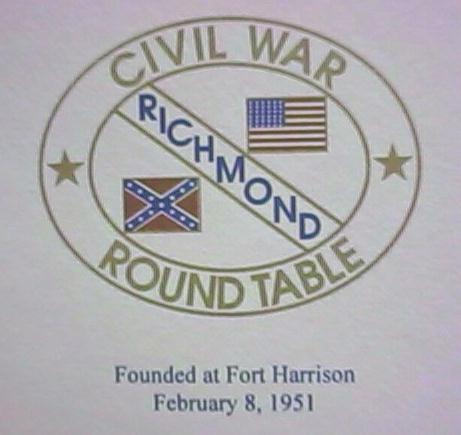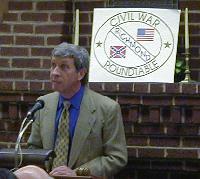


June 2001
Sam Craghead, President Art & Carol Bergeron, Editors 4361F Lakefield Mews 3901 Paces Ferry Road Richmond, VA 23231 Chester, VA 23831-1239 June 2001 PROGRAM Robert A. Jones "Confederate Corsair: The Life of Lt. Charles W. "Savez" Read" 8:00 p.m., Tuesday, June 12, 2001, at the Boulevard United Methodist Church, 321 N. Boulevard, Richmond, VA (corner of Boulevard and Stuart Ave.) When most people think of the Civil War, they think of battles on land - Manassas, Sharpsburg, or Gettysburg. There was another conflict taking place just as significant to the outcome of the war. Union and Confederate navies battled for command of the seas, rivers, and harbors. To see how one sided the writing has been, go to a well-know internet book company, type in "Gettysburg," and you get over 400 books; type in "Confederate States Navy," and you get 26 books. One of the little-known heroes of this maritime legacy is Confederate Lieutenant Charles W. "Savez" Read. After resigning his commission in the U.S. Navy to join the Confederacy in 1861, the young Mississippian served aboard the C. S. S. McRae, Arkansas, Florida, and Webb, taking part in some of the most exciting naval actions of the Civil War. Read's bravery and coolness in battle earned him a reputation as one of the most respected officers in the Confederate States Navy. He has been compared to John Paul Jones. Admiral George Dewey wrote that Read's raiding up the East Coast was worthy of the days of Drake. Robert A. Jones holds a B.S. in mechanical engineering and has been employed by the Navy Department for 35 years. He provided historical background research for a 1970 proposal to the Smithsonian Institution for salvage of the U. S. S. Tecumseh and has published an article on the salvage of the C. S. S. Virginia. Jones is the author of Confederate Corsair, The Life of Lt. Charles W. "Savez" Read, published by Stackpole Books. He currently resides in Potomac, Maryland.
Review of the May ProgramProfessor Gary W. Gallagher presented an interesting and informative talk on how Confederates came to terms with defeat after the Civil War. He began by discussing the reasons historians have advanced for the collapse of the Confederate war effort. Gallagher disputes the contention that dissention behind the lines led to defeat. Looking at what people wrote at the time rather than memoirs produced years later, Gallagher has concluded that the Confederates capitulated because organized and determined Union troops defeated them on the battlefield. Any thoughts of large-scale resistance through guerrilla warfare were suppressed because Southerners realized that they had lost. This did not mean, however, that the former Confederates did not remain bitter for many years. Southerners had reasons to harbor ill will toward their conquerors. They could not find many of their relatives who had been killed on the battlefield and buried far from home. Mass destruction over most of the South, particularly in the major cities, led to poverty. The opposing armies had left wastelands behind them. In places, no barns, animals, or crops remained. Homes and fences had been destroyed. Some people were forced to live in the woods and eat whatever they could find there. Finally, the abolition of slavery was viewed as a great social crime by many Southerners. Former Confederates were the only Americans to ever lose a war. Despite all of this, most former Confederates, both soldiers and civilians, remained loyal to the ideals of Confederacy and those things for which they had given their all. Gallagher quoted one woman who said, "I hope I never love anything as much as I loved the cause." Although many civilians, particularly women, had suffered during the war, they were not bitter about it. They felt they had done whatever was necessary to support the men in the armies. He pointed out that most former Confederates believed that they had had a perfect right to secede and that they never thought of themselves as traitors. Many Southerners harbored deep resentment against the Yankees, and in some cases hatred of Northerners was kept alive for decades after the war. Gallagher looked briefly at Robert E. Lee and how he dealt with defeat. In public, Lee's words spoke strongly for reconciliation. However, in private, he hated what had happened to the South and the Confederate cause. Lee wrote to former general Jubal Early that he wanted to write a history of the war that would tell the truth about what happened. He even asked Early and others to help provide documents so he could begin work. Early eagerly agreed to assist because he, too, worried about how future historians would view Confederate history. Old Jube strongly believed in honoring the brave dead who had fought for a noble cause. Lee was really the most important former Confederate in the years after the war. He was a great example of what was good about the cause. Early and others focused on Lee and his role as a great Christian soldier. Marse Robert became the Confederacy's George Washington, something that had its origins during the war. Supporters of the Lost Cause decided to erect monuments to Lee and became determined to keep alive the honor of the Confederacy. They established holidays on the birthdays of leaders like Lee and Stonewall Jackson, built monuments all over the South, decorated graves, and began trying to preserve battlefields.
Announcements
New Round Table Raffle The book raffle for the June meeting will feature The Beleaguered City: Richmond, 1861-1865, by Alfred Hoyt Bill (1st Edition). Proceeds go to battlefield preservation, so participation in the raffle is encouraged.
Ukrop's Golden Gift Certificates Members of the Round Table are encouraged to save their Ukrop's Golden Gift Certificates and use them for battlefield preservation. Our efforts this year will benefit the Richmond Battlefields Association (RBA). The RBA should obtain its 501(C)(3) designation this year and will actively attempt to preserve local battlefields. Please mail your certificates to David West, 88 West Square Drive, Richmond, VA 23233, or bring them to the June meeting where David will collect them.
Museum Sponsors Civil War Walking Tours The Museum of Culpeper History has begun Civil War Walking Tours of the town for the summer season. Virginia Morton, an authority on the history of the area, will be conducting the tours on the first and third Saturdays of each month, May through October. This two-hour program covers the fighting that took place in Culpeper and the story of the civilians who lived there during the war. Additionally, full or half-day tours can be customized to include the museum; the battlefields of Brandy Station, Cedar Mountain, or Kelly's Ford; and historic homes and buildings. For more information, contact the Museum of Culpeper History, P. O. Box 951, Culpeper, VA 22701, phone (540) 829-1749, or visit www.culpepermuseum.com.
North Anna Campaign Reenactment On August 17-19, a reenactment of the battles of the North Anna Campaign will be held at Rock Castle Farm in historic Hanover County. The program will feature reenactments of the battles of Jericho Mills and Chesterfield Bridge. Rock Castle Farm was the site of Union headquarters on May 24, 1864, and was also used as a Federal field hospital. These events are a part of Hanover Civil War Heritage Weekend. For more information, call (804) 530-1597 or (804) 356-8868 or visit www.civilwarheritageweekend.com.
Civil War Seminar The George Tyler Moore Center for the Study of the Civil War is presenting a seminar "The Civil War and American Society" on June 21-24. Spend a long weekend in historic Shepherdstown, West Virginia, as the program focuses on the soldiers and sailors who participated in the greatest conflict in our nation's history. This program brings together new and renowned scholars and historians. Featured topics include combat aboard the Navy's wooden ships, the relationship between McClellan and the soldiers of the Army of the Potomac, the Military Order of the Loyal Legion of the United States, and more. Presenters at this seminar include Dr. Lesley J. Gordon of the Department of History, University of Akron; Dr. Carol Reardon, professor of history at Penn State University; Tom Clemens, professor of history at Hagerstown Community College; Dennis Ringle, a retired naval commander and author; Frank O'Reilly, resident historian at the Stonewall Jackson Shrine; Dr. Ethan Rafuse, author of several books and articles; and Dana B. Shoaf, associate editor of America's Civil War magazine. Tours will include the Seven Days Battles with Dr. Reardon; the newly restored U. S. S. Constellation at Baltimore's Inner Harbor with Mr. Ringle; and Fort McHenry with Tom Clemens. For a registration form or more information, write The George Tyler Moore Center for the Study of the Civil War, Shepherdstown, WV 25443 or call (304) 876-5429.
Richmond Civil War Round Table Newsletter Art & Carol Bergeron, Editors 3901 Paces Ferry Road Chester, VA 23831-1239
Return to News Letters Index
Return to main page

©R.C.W.R.T. 2000-2001
